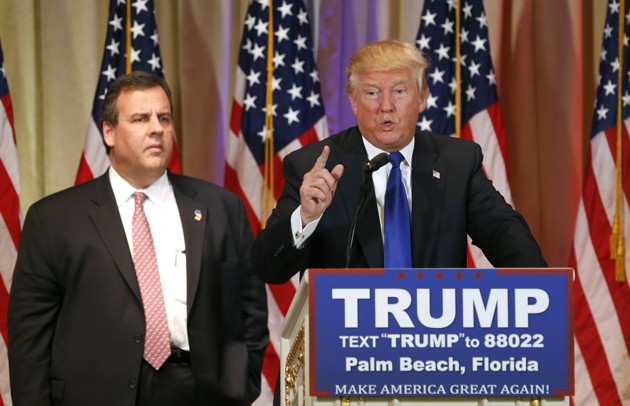

Congratulations to Hillary Clinton! And to Ted Cruz on his Texas and Oklahoma wins. And to Bernie Sanders for his successes. And to Donald Trump for everything else.
When Trump announced last summer, in his famous “they’re sending rapists” presentation, I made the wrongest call I’ve made in many decades in journalism: that Trump would be this cycle’s version of Herman Cain. You can read all about it here.
Obviously it wasn’t just me who got him wrong. Almost anyone who extrapolated from modern U.S. political history had been expecting Trump either to hit a ceiling of demographic or regional support, or to hit a wall as he crossed line after line that for previous candidates had meant going too far:
Insulting John McCain’s war record? Imagining a military record for himself, because he had gone to military school? Revealing first-principles ignorance of the mechanics of national security (the “nuclear triad” flap)? Saying that the previous Republican president lied the country into war? Or that he’d opposed the war beforehand, when he hadn’t? The Klan? For previous candidates, even one or two gaffes like these had been too much. Think of poor Rick Perry with his comparatively harmless brain-freeze over “oops!”
I still think Donald Trump is extremely unlikely to win the presidency. But his chance of being the 45th president is no longer “exactly zero,” as I said last summer — and his chance of being the nominee is obviously very good.
***
So, Trump is something new. By last December, Trump’s improbable progress was so evident that I contributed to a Newsweek feature on “The Worst Thing I Wrote This Year.” You can read my confession here.
Yesterday a Politico reporter, Hadas Gold, asked me whether wrong calls about Trump meant that we had to change all the rules of political reportage. I sent her my earlier Newsweek item and an update. Today she ran this item, quoting part of what I said in email. She was aware (because I told her), but did not mention in her article, that I’d written about this in Newsweek two and a half months ago. Instead her article implied that I was only now being caught out. (“Now, months later, Fallows acknowledges...”) [Update She has now added a Newsweek link to her item, without the usual step of noting that this is an update.]
Just for the record, here’s the full version of what I sent to Hadas Gold last night when she asked whether in the wake of Trump’s rise the rules of political coverage need to be changed:
I think this year's situation is so idiosyncratic, both in party-positioning and in the nature of the candidate, that there is as much risk in over-learning the "lessons of Trump" as in ignoring them.
- In party terms (for the Republicans), it's unusual not simply in the much-discussed impending split between "mainstream" and "outlier" factions, but more profoundly in the party's turning-upon-its-own. This cycle's leading candidate has ridiculed the immediately preceding nominee (Romney) as the worst candidate imaginable -- and has gone on to attack the party's most recent president as having lied the country into war! In the modern two-party era, nothing like this has happened before.
Nor, in party terms, has there ever been anything like the "normal" faction of the party placing its hopes in someone with the unique strength and (as it turned out) weakness of being the brother of a preceding president who is liked in his own party but not by the country as a whole. Hillary Clinton obviously has a similar family-name advantage-and-burden. The difference is that her husband is still popular with the whole electorate, and her party isn't tearing itself apart.
Once that mainstream champion (Jeb) faded, so many others stayed in the race that Trump could keep "winning" with 35 or 40% of the vote.- As for Trump himself, everyone (including me) has had to learn that one or another line-crossings and rule-breakings that would have stopped any previous candidates allow Trump to keep rolling on through. I think an underappreciated factor here is the combination of Trump's distinctive skill, and a changed nature of this cycle's primary.
Trump's distinctive skill is not so much as a business executive, where his record is mixed, but as a TV performer. There's a particular set of skills that go with reality-TV competitions, and Trump is great at them! Meanwhile, the multi-candidate "debates" have become simply indistinguishable from TV reality shows. Thus Trump is in a realm where he is well experienced and knows just how to perform, and all the rest are at sea. They are playing by "rules" -- "give me equal time!" "that fact is not correct!" -- that just don't apply.So I think it's possible to observe what's happening, as it happens. But this year's circumstances -- for the party, and for this man -- are so unusual, in fact unprecedented, that I'm cautious about drawing up any new rules. We'll see how the Trump era goes, and then we'll see whether the landscape has been changed for the long term.
We’re all learning from and about Trump, and about the new rules.